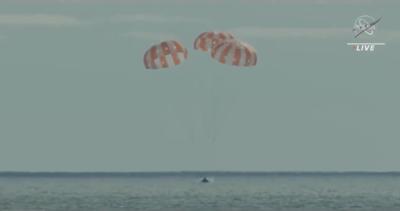Tue, Dec 13, 2022
Uncrewed Test Flight Sees Artemis Capsule Trek Around the Moon and Back
The Orion spacecraft safely and successfully splashed down in the Pacific Ocean, dropping west of Baja California on a lazy Sunday morning after orbiting the moon.

The test began on November 16, when the Orion was sent off to evaluate its capability to bring astronauts to the moon for Artemis II. The result is promising, with the Orion successfully looping around the moon and returning safely to Earth during its 25 and 1/2 day flight. During its journey, the spacecraft performed 2 lunar "flybys", coming within 80 miles of the moon's surface. NASA control sent the ship to the furthest reaches of its control, pushing the limites to see if something would yield, but all evidence points to a thorougly trouble-free voyage.
“The splashdown of the Orion spacecraft – which occurred 50 years to the day of the Apollo 17 Moon landing – is the crowning achievement of Artemis I. From the launch of the world’s most powerful rocket to the exceptional journey around the Moon and back to Earth, this flight test is a major step forward in the Artemis Generation of lunar exploration,” said NASA Administrator Bill Nelson. “It wouldn’t be possible without the incredible NASA team. For years, thousands of individuals have poured themselves into this mission, which is inspiring the world to work together to reach untouched cosmic shores. Today is a huge win for NASA, the United States, our international partners, and all of humanity.”
“With Orion safely returned to Earth we can begin to see our next mission on the horizon which will fly crew to the Moon for the first time as a part of the next era of exploration,” said Jim Free, NASA associate administrator for the Exploration Systems Development Mission Directorate. “This begins our path to a regular cadence of missions and a sustained human presence at the Moon for scientific discovery and to prepare for human missions to Mars.”
“Orion has returned from the Moon and is safely back on planet Earth,” said Mike Sarafin, Artemis I mission manager. “With splashdown we have successfully operated Orion in the deep space environment, where it exceeded our expectations, and demonstrated that Orion can withstand the extreme conditions of returning through Earth’s atmosphere from lunar velocities.”
More News
Hold Procedure A predetermined maneuver which keeps aircraft within a specified airspace while awaiting further clearance from air traffic control. Also used during ground operatio>[...]
Altitude Readout An aircraft’s altitude, transmitted via the Mode C transponder feature, that is visually displayed in 100-foot increments on a radar scope having readout cap>[...]
Aero Linx: European Hang Gliding and Paragliding Union (EHPU) The general aim of the EHPU is to promote and protect hang gliding and paragliding in Europe. In order to achieve this>[...]
Also: Skydio Chief, Uncle Sam Sues, Dash 7 magniX, OR UAS Accelerator US Secretary of the Air Force Frank Kendall was given a turn around the patch in the 'X-62A Variable In-flight>[...]
"The need for innovation at speed and scale is greater than ever. The X-62A VISTA is a crucial platform in our efforts to develop, test and integrate AI, as well as to establish AI>[...]
 ANN's Daily Aero-Term (05.09.24): Hold Procedure
ANN's Daily Aero-Term (05.09.24): Hold Procedure ANN's Daily Aero-Term (05.06.24): Altitude Readout
ANN's Daily Aero-Term (05.06.24): Altitude Readout ANN's Daily Aero-Linx (05.06.24)
ANN's Daily Aero-Linx (05.06.24) Airborne-NextGen 05.07.24: AI-Piloted F-16, AgEagle, 1st 2 WorldView Sats
Airborne-NextGen 05.07.24: AI-Piloted F-16, AgEagle, 1st 2 WorldView Sats Aero-News: Quote of the Day (05.07.24)
Aero-News: Quote of the Day (05.07.24)



